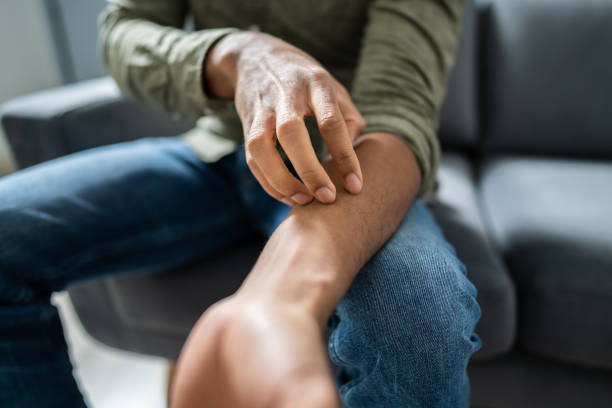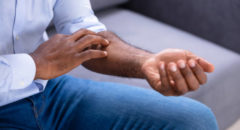
Though it can be hard for you to tell, there are many different types of rashes. Most of them are harmless and can be treated at home with over-the-counter medication or homemade cures. However, sometimes your skin rash is serious and needs to be treated by a doctor so it’s important to know what to watch out for.
10 Signs That Your Rash Is Serious
1. It’s All Over
In many cases, harmless rashes are localized. If your rash covers most or all of your body, it could be cause for concern. This kind of rash might be caused by a drug interaction or a serious allergic reaction. Lyme Disease can also have a similar effect. If you’re immunocompromised, you’re more likely to get a full-body rash than others.
2. It’s Not Getting Better
Harmless rashes typically show signs of getting better within 48 hours, especially if you’re treating them. Rashes that remain the same or get worse usually need medical intervention.
3. It Hurts
It’s never a good thing to feel pain with a rash. Pain can mean that you’re dealing with a viral infection or an illness like shingles. It’s best to have it checked out quickly to prevent the problem from getting worse.
4. It Starts Suddenly And Spreads
Insect bites or exposure to an irritant can result in a sudden rash. However, if your rash develops quickly and immediately starts to spread, you could be dealing with a severe allergic reaction. Since this is unlikely to resolve on its own, you need to see a doctor.
RELATED: Stress Rash: What Is It and How to Treat It
5. It Starts To Blister
If a rash is harmless, it usually maintains its form. Any signs of blistering or sores could indicate that you have a viral infection or a bad reaction to medication that you’ve taken. These kinds of rashes will only get worse if left untreated and a few of them may prove fatal.
6. It Gets Infected
Several factors can lead to a rash being infected. Constantly scratching the rash can lead to broken skin that is easily infected. Additionally, those with chronic skin conditions like eczema and psoriasis may be more susceptible because of a weakened barrier. Signs of an infected rash include pain, crusting, and seeping yellow or green fluid.
7. It Starts To Swell
When you have a simple allergic reaction like hives, you may see some swelling. However, if your rash continues to swell while there is swelling elsewhere, like your face and tongue, this is a significant reaction that needs a doctor’s help.
8. It Gives You A Fever
Sometimes, a rash isn’t the cause of an infection but the result of one. Even if your rash looks normal, having a fever is a sure sign that you need to see a doctor.
9. It Looks Circular
Generally, rashes are round. If your rash is circular or coin-shaped, you could be dealing with a specific type of eczema or ringworm. Rashes that have a bullseye in the middle indicate a tick bite, which can lead to Lyme disease. All of these conditions need to be dealt with by a doctor.
10. It Comes With Shortness Of Breath
A sudden rash that’s accompanied by shortness of breath or wheezing is a sign of anaphylactic shock. This is a severe allergic reaction that can be fatal if left untreated.
RELATED: Random Rash? Here’s What May Be Causing It?
How To Soothe A Rash At Home
If your rash isn’t serious, there are several ways to soothe the itch and encourage it to heal. It’s important to keep the skin clean with mild cleaning agents. Over-the-counter creams will be helpful for soothing the itchiness, so you don’t break the skin. Natural treatments like aloe vera, cold compresses, oatmeal, coconut oil, and apple cider vinegar can also be helpful for managing the itch.
Many rashes are harmless and are easily taken care of. If you notice additional symptoms, though, you need to see a doctor immediately. The causes of a bad rash can range from a skin condition to a life-threatening allergic reaction, so you don’t want to wait.
Skin Rash FAQ: Causes, Types, and When to See a Doctor
How do I identify my rash?
To identify a skin rash, consider the following characteristics:
- Appearance: Is it red, scaly, raised, flat, blistered, or oozing?
- Location: Where on your body did it first appear? Is it spreading?
- Timing: Did it develop suddenly or gradually?
- Symptoms: Is it itchy, painful, burning, or numb?
- Exposure: Have you been exposed to new skincare products, plants (like poison ivy), medications, or foods?
Tip: Take clear photos of your rash and note any other symptoms (fever, fatigue, joint pain). A dermatologist or primary care provider can use this information to make a more accurate diagnosis.
What are the 4 types of rash?
While rashes come in many forms, they’re often categorized into four broad types based on cause:
- Infectious Rashes: Caused by viruses (chickenpox, measles), bacteria (impetigo), or fungi (ringworm).
- Allergic/Contact Rashes: Triggered by allergens or irritants (e.g., poison ivy, nickel, soaps).
- Inflammatory Rashes: Related to chronic skin conditions like eczema, psoriasis, or rosacea.
- Autoimmune/Systemic Rashes: Linked to internal conditions like lupus or dermatomyositis.
What does an MS rash look like?
Multiple Sclerosis (MS) itself doesn’t typically cause rashes. However, some people with MS develop rashes due to:
- MS medications (like interferon beta or corticosteroids), which can cause injection site reactions or allergic rashes.
- Secondary autoimmune issues or other skin conditions that may coexist with MS.
- Common characteristics: Red, itchy bumps or blotches near injection sites or elsewhere on the body. Always speak to your doctor if you notice new skin changes while managing MS.
What are the top 5 most common rashes?
Here are five of the most commonly seen rashes:
- Eczema (Atopic Dermatitis): Dry, red, itchy patches, often behind knees, on arms, or cheeks.
- Contact Dermatitis: A red, itchy rash caused by direct contact with an irritant or allergen.
- Heat Rash (Miliaria): Small, red bumps and a prickly feeling caused by blocked sweat glands.
- Psoriasis: Thick, silvery scales and red patches, usually on elbows, scalp, or knees.
- Hives (Urticaria): Raised, itchy welts that may move around the body, often caused by allergies or stress.
When Should I See a Doctor About a Rash?
Seek medical attention if your rash:
- Spreads rapidly
- Is painful or blistering
- Comes with a fever or swollen lymph nodes
- Doesn’t improve after a few days of home treatment
- Appears infected (with pus, warmth, or red streaks)









